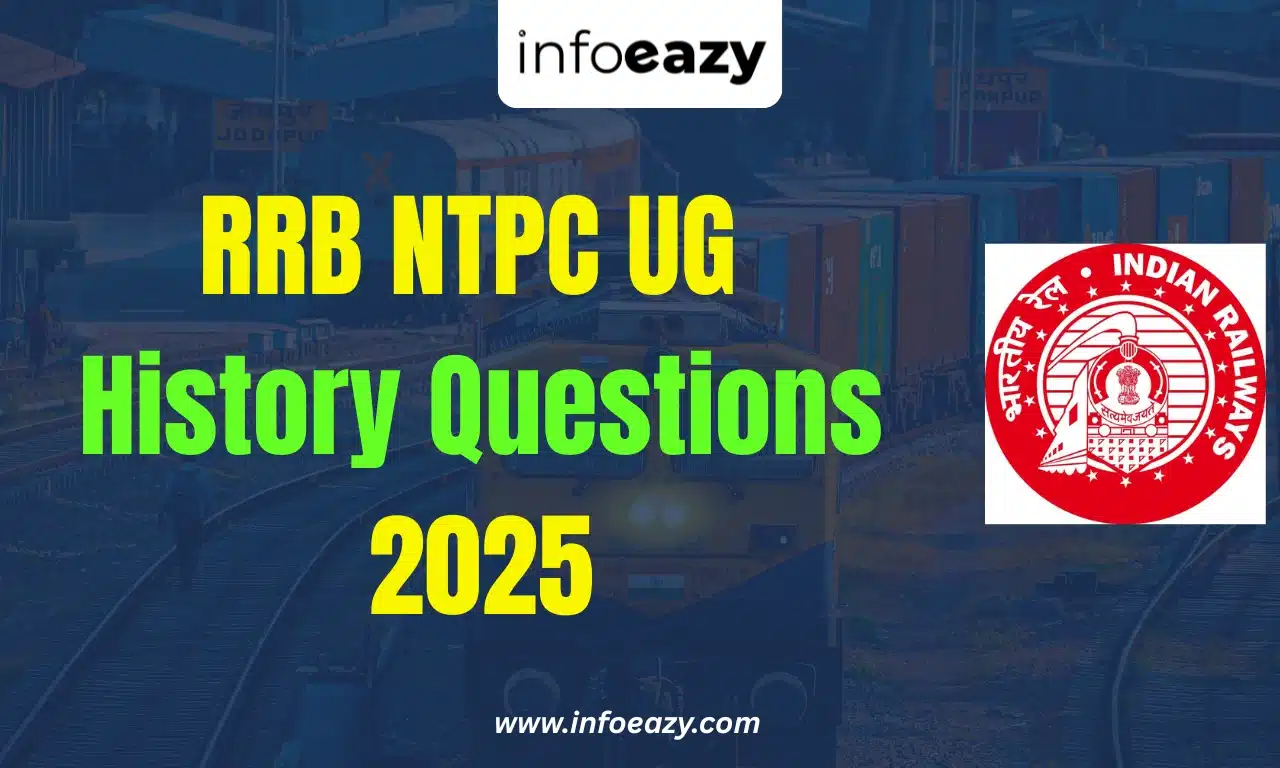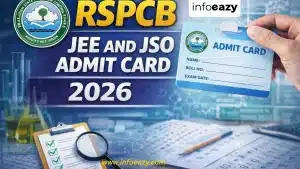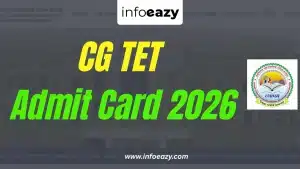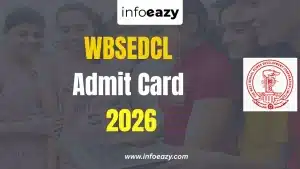The RRB NTPC Undergraduate Exam is a highly competitive railway exam that tests candidates on various subjects, including General Awareness. Among these, History plays a crucial role, with questions ranging from ancient to modern India, and sometimes even world history. Understanding the types of history questions that appear in the exam can significantly help candidates improve their performance. This article covers the Top 40 Most Expected History Questions and Solutions for the RRB NTPC UG 2025 exam, compiled from previous year trends and updated topics
RRB NTPC UG History Questions 2025
In the General Awareness section of the RRB NTPC UG exam, history-based questions are common. These can be factual, analytical, or concept-based. The questions cover Ancient India, Medieval India, Modern India, and the freedom movement. To help aspirants with targeted preparation, we have listed 40 most expected questions that are relevant, moderate to difficult in level, and suitable for the upcoming 2025 exam.
Also Check: RRB NTPC UG Reasoning Questions 2025, Top 30 Most Expected Questions and Solutions
RRB NTPC UG History Questions 2025: Overview
Candidates can check a quick overview of the History questions section in the table below:
| RRB NTPC UG History Questions 2025: Overview | |
| Aspect | Description |
| Exam Name | RRB NTPC Undergraduate Exam 2025 |
| Subject Covered | History (Static GK) |
| Types of Questions | Objective (Multiple Choice) |
| Difficulty Level | Easy, Moderate, and Difficult Mixed |
| Topics Included | Ancient, Medieval, Modern Indian History |
| Number of Questions Listed Here | 40 |
| Question Format | Objective with 4 Options |
Top 40 Most Expected RRB NTPC UG History Questions 2025
Below are the 40 objective-type history questions most likely to appear in the RRB NTPC UG 2025 exam, along with their correct answers:
1. Who was the founder of the Maurya Empire?
a) Bindusara
b) Ashoka
c) Chandragupta Maurya
d) Harshavardhana
Ans: c) Chandragupta Maurya
2. The capital of the Pallava dynasty was:
a) Tanjore
b) Kanchipuram
c) Madurai
d) Tiruchirappalli
Ans: b) Kanchipuram
3. Which Viceroy introduced the Doctrine of Lapse?
a) Lord Wellesley
b) Lord Dalhousie
c) Lord Canning
d) Lord Curzon
Ans: b) Lord Dalhousie
4. The Battle of Plassey was fought in:
a) 1761
b) 1757
c) 1857
d) 1748
Ans: b) 1757
5. Who composed the Allahabad Pillar inscription?
a) Banabhatta
b) Harisena
c) Kalidasa
d) Vishakadatta
Ans: b) Harisena
6. The Permanent Settlement was introduced by:
a) Warren Hastings
b) Lord Cornwallis
c) Lord Ripon
d) Lord Curzon
Ans: b) Lord Cornwallis
7. Who was the first woman ruler of Delhi Sultanate?
a) Noor Jahan
b) Razia Sultana
c) Rani Durgavati
d) Chand Bibi
Ans: b) Razia Sultana
8. In which year was the Quit India Movement launched?
a) 1942
b) 1930
c) 1920
d) 1947
Ans: a) 1942
9. Who was the President of the Indian National Congress during its Lahore session in 1929?
a) Mahatma Gandhi
b) Jawaharlal Nehru
c) Motilal Nehru
d) Sardar Patel
Ans: b) Jawaharlal Nehru
10. The Indus Valley Civilization was discovered in the year:
a) 1921
b) 1942
c) 1911
d) 1905
Ans: a) 1921
11. Who gave the slogan “Swaraj is my birthright”?
a) Bal Gangadhar Tilak
b) Subhas Chandra Bose
c) Mahatma Gandhi
d) Lala Lajpat Rai
Ans: a) Bal Gangadhar Tilak
12. The Simon Commission was sent to India in:
a) 1919
b) 1927
c) 1935
d) 1942
Ans: b) 1927
13. Which Mughal Emperor built the Buland Darwaza?
a) Akbar
b) Jahangir
c) Shah Jahan
d) Aurangzeb
Ans: a) Akbar
14. The ‘Dandi March’ was started from:
a) Ahmedabad
b) Sabarmati
c) Wardha
d) Bombay
Ans: b) Sabarmati
15. Who wrote the book ‘Discovery of India’?
a) B.R. Ambedkar
b) Mahatma Gandhi
c) Jawaharlal Nehru
d) Rajendra Prasad
Ans: c) Jawaharlal Nehru
16. The Civil Disobedience Movement began in:
a) 1930
b) 1929
c) 1935
d) 1942
Ans: a) 1930
17. Who introduced the Mansabdari System?
a) Akbar
b) Babar
c) Humayun
d) Shah Jahan
Ans: a) Akbar
18. Battle of Buxar was fought in the year:
a) 1757
b) 1764
c) 1772
d) 1782
Ans: b) 1764
19. The slogan ‘Inquilab Zindabad’ was popularized by:
a) Bhagat Singh
b) Subhas Chandra Bose
c) Lala Lajpat Rai
d) Chandrashekhar Azad
Ans: a) Bhagat Singh
20. The Jallianwala Bagh Massacre occurred in:
a) 1919
b) 1921
c) 1930
d) 1942
Ans: a) 1919
21. Who was the first woman ruler of India to sit on the throne of Delhi?
A) Razia Sultana
B) Rani Durgavati
C) Chand Bibi
D) Noor Jahan
Answer: A) Razia Sultana
22. The Battle of Plassey in 1757 was fought between the British and which ruler?
A) Shah Alam II
B) Siraj-ud-Daula
C) Mir Jafar
D) Hyder Ali
Answer: B) Siraj-ud-Daula
23. The ‘Doctrine of Lapse’ was introduced by which Governor-General of India?
A) Lord Dalhousie
B) Lord Cornwallis
C) Lord Curzon
D) Lord Wellesley
Answer: A) Lord Dalhousie
24. Who founded the Arya Samaj in 1875?
A) Swami Vivekananda
B) Raja Ram Mohan Roy
C) Swami Dayananda Saraswati
D) Ishwar Chandra Vidyasagar
Answer: C) Swami Dayananda Saraswati
25. Which Mughal Emperor built the Red Fort in Delhi?
A) Akbar
B) Humayun
C) Shah Jahan
D) Aurangzeb
Answer: C) Shah Jahan
26. Who led the Revolt of 1857 in Kanpur?
A) Rani Laxmibai
B) Tatya Tope
C) Nana Sahib
D) Bahadur Shah Zafar
Answer: C) Nana Sahib
27. The Non-Cooperation Movement was launched in which year?
A) 1919
B) 1920
C) 1922
D) 1930
Answer: B) 1920
28. Who was the founder of the Maurya Empire?
A) Ashoka
B) Chandragupta Maurya
C) Bindusara
D) Kautilya
Answer: B) Chandragupta Maurya
29. In which year did the Jallianwala Bagh Massacre occur?
A) 1917
B) 1919
C) 1921
D) 1923
Answer: B) 1919
30. The term “Din-i-Ilahi” is associated with which ruler?
A) Babur
B) Akbar
C) Humayun
D) Shah Jahan
Answer: B) Akbar
31. Who wrote the book ‘Discovery of India’?
A) Mahatma Gandhi
B) Dr. B.R. Ambedkar
C) Subhas Chandra Bose
D) Jawaharlal Nehru
Answer: D) Jawaharlal Nehru
32. The capital of Magadh during the Mauryan period was?
A) Patliputra
B) Rajgir
C) Nalanda
D) Vaishali
Answer: A) Patliputra
33. Who gave the slogan “Swaraj is my birthright and I shall have it”?
A) Bal Gangadhar Tilak
B) Bhagat Singh
C) Dadabhai Naoroji
D) Jawaharlal Nehru
Answer: A) Bal Gangadhar Tilak
34. Who was the Viceroy of India during the Quit India Movement?
A) Lord Irwin
B) Lord Linlithgow
C) Lord Mountbatten
D) Lord Wavell
Answer: B) Lord Linlithgow
35. Which Indian leader attended all three Round Table Conferences?
A) Mahatma Gandhi
B) Dr. B.R. Ambedkar
C) Subhas Chandra Bose
D) Jawaharlal Nehru
Answer: B) Dr. B.R. Ambedkar
36. The Harappan Civilization was discovered in which year?
A) 1901
B) 1911
C) 1921
D) 1931
Answer: C) 1921
37. The slogan “Inquilab Zindabad” was popularised by?
A) Chandrashekhar Azad
B) Sardar Vallabhbhai Patel
C) Bhagat Singh
D) Rajguru
Answer: C) Bhagat Singh
38. The famous rock-cut caves at Ajanta were developed during which period?
A) Gupta Period
B) Maurya Period
C) Kushana Period
D) Harappan Period
Answer: A) Gupta Period
39. The Treaty of Alinagar was signed between the British and?
A) Siraj-ud-Daula
B) Mir Qasim
C) Mir Jafar
D) Tipu Sultan
Answer: A) Siraj-ud-Daula
40. Who among the following was not a part of the ‘Lal Bal Pal’ trio?
A) Lala Lajpat Rai
B) Bal Gangadhar Tilak
C) Gopal Krishna Gokhale
D) Bipin Chandra Pal
Answer: C) Gopal Krishna Gokhale
RRB NTPC UG History Questions 2025 FAQs
Q1. How many history questions come in RRB NTPC UG Exam? +
Q2. Are the history questions only about Indian history? +
Q3. What is the level of difficulty of History questions in NTPC UG? +
Q4. Which topics are most important in history for RRB NTPC UG 2025? +
Q5. How can I prepare for History in NTPC UG 2025? +
Tags: History Practice Questions rrb ntpc RRB NTPC UG RRB NTPC UG History Questions RRB NTPC UG History Questions 2025




